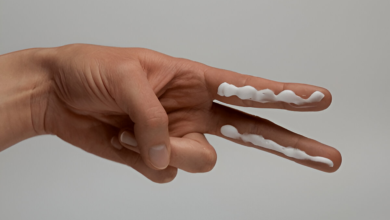Smart Scales: Do They Really Help with Weight Loss?
Smart scales for weight loss Do they really work. Discover if these high tech scales actually help you lose weight or are just another gadget.

Smart scales have revolutionized weight tracking by offering far more than just a number on a screen. These high-tech devices measure body composition including body fat percentage, muscle mass, water retention, and even bone density providing users with a more comprehensive view of their health. Unlike traditional scales, which only track weight, smart scales sync with fitness apps to analyze trends and offer personalized insights. But do these advanced features actually contribute to weight loss success, or are they just another gadget with limited real-world benefits?
While smart scales can be motivating by revealing subtle changes in body composition, they are not a magic solution for weight loss. True progress still depends on consistent healthy habits, including proper nutrition, regular exercise, and lifestyle adjustments. For some, the detailed data serves as a powerful accountability tool, while others may find it overwhelming or unnecessary. This article explores whether smart scales genuinely aid in weight loss or if they’re simply a tech trend with exaggerated claims.
Smart Scales: Do They Really Help with Weight Loss?
Smart Scales
The rise of smart scales has revolutionized the way people track their fitness progress. Unlike traditional scales that only display weight, smart scales measure multiple body composition metrics, including body fat percentage, muscle mass, water retention, and even metabolic age. These devices sync with smartphones and fitness apps, allowing users to monitor trends over time. But the real question is: do they actually contribute to weight loss success, or are they just another piece of tech with limited practical benefits?
How Smart Scales Work
Smart scales use bioelectrical impedance analysis (BIA) to estimate body composition. When you step on the scale, a small electrical current passes through your body, measuring resistance to determine fat, muscle, and water levels. While not as precise as medical-grade devices like DEXA scans, they provide a reasonable estimate for personal tracking. Many models also integrate with apps like Apple Health, Google Fit, or MyFitnessPal, consolidating data for a comprehensive health overview.
Potential Benefits for Weight Loss
One of the biggest advantages of smart scales is their ability to offer more than just weight numbers. Seeing fluctuations in body fat or muscle mass can be more motivating than watching the scale go up or down. For example, someone may notice their weight staying the same but their body fat percentage decreasing—indicating muscle gain, which is a positive change. This detailed feedback can help users adjust their diet and exercise routines more effectively.
Additionally, the convenience of automatic data tracking reduces the hassle of manual logging. Many people find that consistent tracking improves accountability, making them more likely to stick to their weight loss goals. Some smart scales even offer personalized recommendations based on trends, further enhancing their usefulness.
Limitations and Considerations
Accuracy Variances
Smart scales use bioelectrical impedance analysis (BIA), which can be affected by hydration levels, recent meals, exercise, and even skin temperature. This leads to fluctuations in readings, making them less reliable than medical-grade devices like DEXA scans or hydrostatic weighing.
Overemphasis on Data
While tracking metrics can be motivating, some users may develop an unhealthy fixation on daily fluctuations, leading to stress or obsessive behavior rather than focusing on long-term health trends.
Not a Standalone Solution
Smart scales provide data but don’t directly contribute to weight loss. Without proper diet, exercise, and lifestyle changes, the numbers on the scale—no matter how detailed—won’t lead to meaningful progress.
Cost vs. Value
High-end smart scales can be expensive, and while they offer advanced features, not all users need extensive body composition tracking. A basic scale may suffice for those solely monitoring weight.
User Dependency & Consistency Issues
For accurate trends, measurements should be taken under consistent conditions (e.g., same time of day, hydration level). Many users fail to maintain this discipline, leading to misleading data.
Limited Use for Certain Populations
BIA technology may be less accurate for athletes with high muscle mass, pregnant women, or individuals with pacemakers, as body composition algorithms aren’t always optimized for these groups.
Privacy Concerns
Since smart scales sync with apps and cloud storage, users should be aware of data security risks, especially if health information is shared across multiple platforms.
Are Smart Scales Worth It?
For individuals who enjoy tracking detailed metrics and find motivation in data, smart scales can be a helpful tool. They provide a more holistic view of health than traditional scales, making it easier to track progress beyond just weight. However, they are not a substitute for healthy habits. Weight loss ultimately depends on nutrition, exercise, sleep, and stress management—factors that no scale can control.
Final Verdict
Smart scales can be a valuable addition to your weight loss journey, offering detailed insights beyond just body weight. By tracking metrics like body fat percentage, muscle mass, and water retention, they provide a more holistic view of your progress helping you stay motivated and make informed adjustments to your fitness and nutrition plans. However, they are not a magic solution; real results still depend on consistent healthy habits, including a balanced diet, regular exercise, and sustainable lifestyle changes.
Ultimately, whether a smart scale is worth the investment depends on your personal preferences and goals. If you thrive on data-driven motivation and enjoy tracking detailed health metrics, a smart scale can be a powerful tool. But if you prefer simplicity or find excessive data overwhelming, a traditional scale paired with mindful eating and exercise may be just as effective. The key is to use smart scales as a supportive tool rather than relying on them as the sole measure of success.
Read More: How to Overcome Weight Loss Plateaus Like a Pro
Conclusion
Smart scales offer a high-tech approach to weight management, providing valuable body composition data that goes far beyond traditional scales. By tracking metrics like body fat percentage, muscle mass, and water retention, they can help users gain deeper insights into their health and fitness progress. For data driven individuals, this detailed feedback can be highly motivating, offering tangible evidence of changes that might not be visible on a standard scale.
However, it’s important to remember that smart scales are tools not solutions. While they provide useful information, they don’t directly cause weight loss. Sustainable results still require a balanced diet, regular exercise, and healthy lifestyle habits. If you enjoy tracking metrics and find that data keeps you accountable, a smart scale could be a worthwhile investment. But if you prefer simplicity or tend to obsess over numbers, a basic scale and mindful habits may serve you just as well. In the end, smart scales can support your journey, but they’re only as effective as the effort you put into your overall health.
FAQs
Do smart scales accurately measure body fat?
Smart scales use BIA technology, which provides estimates rather than medical-grade accuracy. Results can vary based on hydration and other factors.
Can smart scales help with muscle gain tracking?
Yes, many smart scales track muscle mass, allowing users to monitor strength training progress alongside weight changes.
How often should I weigh myself on a smart scale?
Experts recommend weighing yourself once a week at the same time (e.g., morning before eating) to track trends without daily fluctuations causing stress.
Are smart scales better than regular scales for weight loss?
They offer more data, which can be motivating, but weight loss success depends on diet and exercise, not just tracking.
Do I need a smart scale if I already use a fitness tracker?
It depends if your tracker doesn’t measure body composition, a smart scale can provide additional insights for a more complete health picture.











